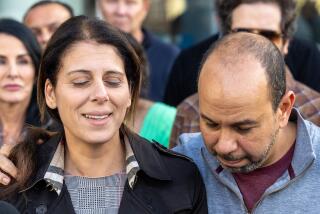Father Convicted in Hockey Killing
CAMBRIDGE, Mass. — In a case that has come to symbolize the perils of excessive parental involvement in youth sports, hockey father Thomas Junta was found guilty of involuntary manslaughter Friday in the beating death of fellow sports dad Michael Costin.
The 44-year-old Junta gazed down and his chin jutted out briefly as the guilty verdict was read, following a day and a half of deliberation by the jury of nine women and three men.
In a crowded courtroom filled with Junta’s large and loyal family, the tension of the moment was heightened when the jury forewoman at first offered no verdict. Three times, the court clerk requested the decision. And Superior Court Judge Charles Grabau was forced to inquire twice, “Is he guilty or not guilty?” Finally, the forewoman said, “Number three--guilty,” referring to the lesser charge of involuntary manslaughter on the jury’s verdict form.
From the spectators’ seating area, an anguished cry rang out from the Junta family. One of his five sisters, Jessica, buried her head in her hands and wept. Several of his six brothers also sobbed.
Junta showed little emotion as he was immediately led away into state custody.
For the killing of Costin during a fight watched by children at a hockey rink, Junta faces a maximum sentence of 20 years in prison. However, state guidelines for first offenders prescribe a sentence of three to five years. Sentencing is scheduled for Jan. 25.
Defense Worried Jury Would Compromise
As prosecutors hoped--and as the defense team feared--the involuntary manslaughter conviction represented a middle-ground decision. The conviction implies that Junta used excessive force but did not necessarily intend to kill his opponent.
Though the prosecution had asked for a verdict of voluntary manslaughter, Dist. Atty. Martha Coakley said she was satisfied with the decision.
But noting that as a result of the decision there were now two sets of children with no father at home, Coakley said: “There is no joy therefore in this resolution.”
Defense attorney Thomas Orlandi Jr., who had argued that Junta was not guilty because he acted in self-defense, said in a statement that his client was “sorry and sympathetic for the Costin family’s loss and crushed that he will be separated from both his wife and two children.”
The fatal fight occurred July 5, 2000, at Burbank Ice Arena in nearby Reading. The three sons of Costin were on one side of a pickup hockey game, while Junta’s son, Quinlan, was on the other. All the boys were 10 to 12 years old at the time.
When the game turned rough, Junta challenged Costin, who was supervising on the ice in hockey gear. Their dispute spilled over into a locker room, where a college-age hockey player separated the two men as they traded punches.
Junta, a truck driver who then weighed 275 pounds, left the arena but returned. In front of a dozen children, including their own sons, the two men fought again, this time in an open area near the rink. Several onlookers who appeared as witnesses in the trial--among them, Quinlan Junta--said they yelled at Junta and Costin to stop.
The confrontation was swift: a fracas that began and ended in a matter of minutes.
Forty-year-old Michael Costin, a carpenter who weighed 156 pounds, was left unconscious on a rubber mat. He died the next day of injuries so severe that a medical expert said his head was nearly severed.
With 35 million American children involved in organized sports, the nationally televised case became emblematic of what youth-sports specialists say is a growing trend of violence among parents at children’s sports events.
Dist. Atty. Coakley said Friday that “if any good can come of this, it will be that we will not see another parent on an autopsy table as a result of parental rage over children’s sports.”
Throughout the weeklong court proceedings, the Costin and Junta families passed each other icily. During courtroom breaks, the hallways resembled a demilitarized zone, Costins on one side and Juntas on the other.
Difficult Encounter Goes Peacefully
Inadvertently in the hallway on Friday, Thomas Junta found himself face to face with Gus Costin, the father of his victim.
The older man reached out to touch Junta’s shoulder, telling him, “I don’t have any animosity toward you. I don’t hate you.”
Junta, Costin said, nodded and put his hand out. As the two men shook hands, Costin said, “I forgive you.”
Gus Costin said his grandsons have had a rough time since their father’s death. Two live with their mother--who was separated from Michael Costin--and one is in foster care. All three have had therapy to cope with their father’s death, he said.
Costin suggested Friday that after he is released from prison, Junta might consider working to educate other parents about what can happen when tempers rage out of control at children’s sporting events.
Though present earlier in the trial, Junta’s son, Quinlan, and daughter, Kendall , were absent when the verdict was returned. Orlandi said his client spent much of the day Friday writing letters to both children--as well as his wife, Michelle--”telling them all how much they mean to him and thanking them for standing by him.”
Jurors, including two alternates, came out as a group after the court was recessed and termed the verdict “a very difficult but proper decision.”
Flanked by the dead man’s children Brendan, 14, Michael, 13, Sean, 12, and Tara, 11, a sister of Michael Costin, Mary Barbuzzi, read a statement praising him as “a loving brother, caring son, but most of all . . . a dedicated father.”
Attorney Orlandi offered much the same assessment of his client.
“Tom Junta is not the person he has been made out to be, but in fact is a loving father and husband” who has “spent his entire married life driving a truck, four long days, weekly, to allow him participation in his children’s sports activities during the other three days,” Orlandi said.
The case was an all-around tragedy, Orlandi said: “Everyone lost here--everyone lost.”
More to Read
Go beyond the scoreboard
Get the latest on L.A.'s teams in the daily Sports Report newsletter.
You may occasionally receive promotional content from the Los Angeles Times.






